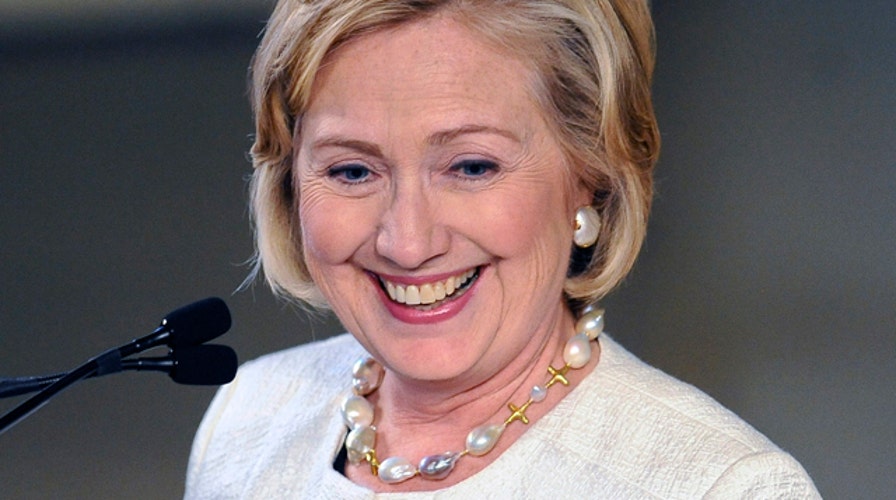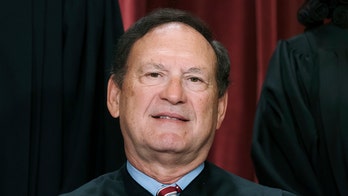Hillary Clinton navigates new divide in Democratic Party
Fox News editor-at-large Peter Boyer weighs in
When Lawrence Summers withdrew from consideration as the next head of the Federal Reserve, he performed a great service for the Democratic Party’s two most important figures -- Barack Obama, and his presumed (by Democrats) successor, Hillary Clinton.
The president was spared an embarrassing Senate confirmation fight, with likely defections from his own party. And Clinton avoided an episode that might have forced her to confront a question that she has, so far, happily avoided: If she runs for president, will she dare to do so as a Clinton Democrat?
Summers’ undoing was largely the work of the ascendant left wing of the Democratic Party, an increasingly assertive faction that saw in Summers a remnant of a political approach it roundly rejects – the “New Democrat” politics of former President Bill Clinton.
One pillar of Clintonism was a reorientation of the party toward Wall Street, where Clinton, in 1992, found his chief economic adviser, Robert Rubin, the co-chairman of Goldman Sachs (and a trove of new money for Democratic coffers). Rubin and his protégé, Summers, both served Clinton as Treasury secretary, and both advocated for de-regulation of the financial sector – a policy that much of the left blames for the 2008 financial meltdown.
From the moment in July that Obama mentioned that current Fed Chairman Ben Bernanke was leaving the post, two things became clear: Obama was determined that Summers would become the next Fed chairman, and liberal Democrats were just as determined that he wouldn’t.
The fact that the Summers push collapsed before Obama even made the nomination shows that the real energy in the Democratic Party is in the progressive populist base, whose ideology more closely resembles that of the Occupy movement than the centrism of Bill Clinton. For all the notice of current Republican disunity, the divide on the left is just as real, and will be especially tricky for Hillary Clinton to navigate as she positions herself for a presumed 2016 presidential run.
A fractious nomination process for Summers would have disrupted Clinton’s deliberate, carefully managed re-entry into political life (a slow rollout of soft interviews, Clinton Foundation events, and a body of Tweets redolent of staff contrivance). She might have been expected to endorse her husband’s friend and former Treasury secretary, but the progressive base that opposed Summers has a decisive say in the presidential primary season -- and that base is waiting to see where Clinton lands on key issues.
“Many of Hillary Clinton’s positions are currently frozen in time, in the years 2007-2008,” said Adam Green, co-founder of the Progressive Change Campaign Committee (PCCC), an activist organization claiming nearly 1 million members. “On most issues, there’s still a big question mark. Progressive voters will want to hear her address those issues that are currently at the core of the debate.”
It is remarkable that there remains any mystery about a woman who has been at the center of Democratic politics for a generation, and who is broadly seen as the inevitable Democratic presidential nominee in 2016. But Hillary Clinton knows something about the perils of inevitability, especially those arising from the party’s left wing.
In her last sure-thing run for president, in 2008, Clinton made the calculation not to apologize for her Senate vote authorizing the war in Iraq (as her rival John Edwards did, and as Barack Obama, who’d condemned the “dumb war” from the distance of an Illinois state senate seat, didn’t need to do). That calculation created an opening for an insurgency campaign from the left, which Obama quickly seized.
By the end of that Democratic primary season, the activist left had turned against Clinton with striking vehemence. At MSNBC, which seemed, by then, to have become an extension of the Obama campaign, Keith Olbermann broadcast anti-Clinton commentaries so lacerating his bosses worried about alienating the channel’s core audience of liberals. He accused Clinton supporters of “cheap, ignorant, vile racism” and said that Clinton “has no business being, and no capacity to be, the president of the United States."
PCCC’s Green told Fox News that Clinton will be similarly vulnerable in 2016 if she fails to correctly gauge the sentiments of the progressive base. “If Hillary Clinton misses the fundamental dynamic of our times, that people are really mad at Wall Street and want the Democratic Party to take them on,” said Green, “then I’d say that would make her out of touch, and would invite a primary challenge.”
It will be easy enough now for Clinton to endorse the liberals’ favorite candidate for the Fed, current vice-chair Janet Yellen, and, she may well advocate for a strict new regulatory stance toward Wall Street (despite her husband’s record). On other issues dear to the left, she may find more dangerous going.
Free trade was a centerpiece of Bill Clinton’s New Democrat agenda, a policy that continues to displease labor. Just last week [Oct. 3], AFL-CIO President Richard Trumka assailed the proposed Trans-Pacific Partnership as a “destructive trade deal” that threatens the survival of working-class Americans, and vowed to lead a campaign to defeat it. Clinton, as secretary of state, had a lead role in drafting the agreement.
And, perhaps most challenging for Clinton, will be deciding where to land on the matters of the national debt, and entitlement reform. The Simpson-Bowles Commission, which laid out a bipartisan blueprint for a long-term fiscal fix, reflected the Clinton Democrat view that debt-and-deficit control was key to economic growth. The left hated the “grand bargain” approach (“Simpson Bowles is terrible” was a Paul Krugman recurring theme), partly because it depended on entitlement reform.
Clinton Democrats, though, continue to carry the grand bargain torch. Ed Rendell, the Democratic former governor of Pennsylvania, co-chairs the successor organization to the Simpson-Bowles Commission, and travels the country selling his conviction that “the long-term growth of our debt is a huge ticking time bomb,” as he recently told Fox News.
“Even with the sequester in place, our debt by 2045 will be 200 percent of our GDP,” Rendell said, “which is where Greece is today.”
A favorite entitlement fix among the reform advocates (and one even suggested by President Obama) is a change in the way that cost-of-living increases are reckoned for benefit payments, including Social Security, which could save $225 billion over the next decade.
“Members of the left wing of the Democratic Party are violently against it,” Rendell said. “But you can’t expect Republicans to support tax reform that produces significant additional revenue from the rich without some serious concessions on the entitlement side.”
Rendell, a stout supporter of Hillary Clinton’s, believes that she would support such reforms in any grand bargain – either from the sidelines now, or in a possible future Clinton presidency. “I think that secretary Clinton has the courage to do that, and I think she has the leadership to both make the deal with Republicans, and then sell it to Democrats,” he said.
But Adam Green warns that Clinton would be doing so at her own peril. “What grassroots activist is going to want to volunteer for somebody who is proposing to cut their grandparents’ Social Security?” Green said.
Only if Hillary Clinton declares herself clearly and emphatically to be in sync with the progressive wing of her party – effectively renouncing Clintonism in the process – would “she have a very united Democratic progressive base behind her,” Green said.
“But if she does not take these positions, or keeps her positions undisclosed,” he added, “then there will be a search for alternatives.”
Asked to name a possible alternative to Clinton, Green doesn’t hesitate: “An Elizabeth Warren type.”
Freshman Sen. Warren, of Massachusetts, is the current Democrat to whose tune populist progressives reflexively thrill. With her rhetorical jeremiads against big banks and big business, she was the star of last month’s AFL-CIO convention, as, indeed, she was of last year’s Democratic National Convention, and pretty much any crowd in which progressives are among the number. She has not overtly indicated an interest in a 2016 presidential run, but she would pose a formidable threat to Clinton. Not only would a Warren candidacy blunt Clinton’s implicit “first woman” appeal, but Warren has shown a talent for monetizing grassroots fervor – her $42 million campaign chest in 2012 more than doubled that of the next-closest Democratic senatorial candidate.
A liberal insurgent alternative could also appear seemingly out of nowhere, as former Vermont Gov. Howard Dean did in 2004.
But it may turn out that the progressive alternative to Clintonism will be Hillary Clinton herself. The Clintons have, through the years, shown themselves keenly attuned to the political weather, and able to accommodate themselves to shifting winds. Bill Clinton fostered the Don’t Ask, Don’t Tell policy for the armed forces, and signed the Defense of Marriage Act. Hillary Clinton has now endorsed gay marriage.
“She’s been evolving politically,” noted Adam Green. “I think there is ample precedent for Clintonites being against now what was their policy before.”





